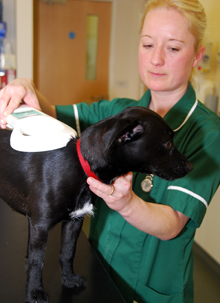College produces new guidance on compulsory microchipping of dogs
23 March 2016
We have produced new guidance for both veterinary surgeons and veterinary nurses on the compulsory microchipping regulations for dogs, which will come into force in England, Scotland and Wales next month.
 The three nations have published separate sets of regulations, but they all oblige keepers of dogs to microchip animals over the age of eight weeks, if they have not done so already.
The three nations have published separate sets of regulations, but they all oblige keepers of dogs to microchip animals over the age of eight weeks, if they have not done so already.
Each set of regulations includes a ‘health’ exemption from the general obligation to microchip, stipulations as to who can implant microchips in dogs, an obligation to report adverse reactions to microchipping and details of various offences in relation to the regulations.
Ahead of the regulations coming into force, we have updated the chapter of supporting guidance to our Code of Professional Conduct for both veterinary surgeons and veterinary nurses to provide further advice to members of the professions on the regulations.
Laura McClintock, our Standards and Advisory Manager, said: “We recommend that veterinary surgeons and veterinary nurses familiarise themselves with the regulations applicable in their part of the UK as, despite broad similarities, there are some very slight differences to be mindful of.
"For example, each set of regulations has slightly different stipulations as to what details should be recorded on a database and the health exemptions are worded slightly differently.
“We would also like to take this opportunity to reiterate the advice issued by our Standards Committee last year that, after 6 April 2016, a veterinary surgeon or veterinary nurse who discovers that a dog has not been microchipped will not be obliged to report this to the authorities.
"However, they may wish to advise the dog owner of the new regulations and encourage them to comply.”
The regulations for the three nations are as follows:
- Microchipping of Dogs (England) Regulations
- Microchipping of Dogs (Scotland) Regulations
- Microchipping of Dogs (Wales) Regulations
Any veterinary surgeons or veterinary nurses in need of further advice about the supporting guidance can contact our Standards and Advice Team on 020 7202 0789 or [email protected]